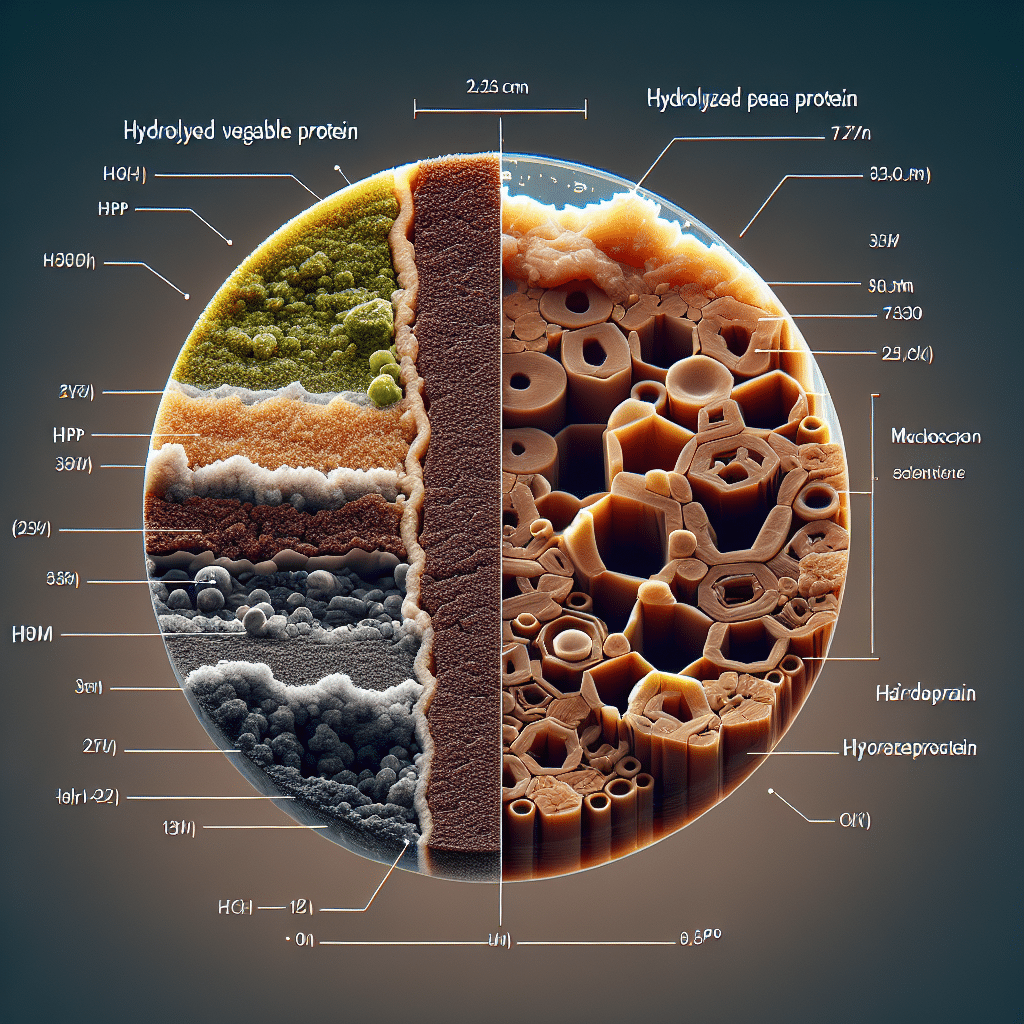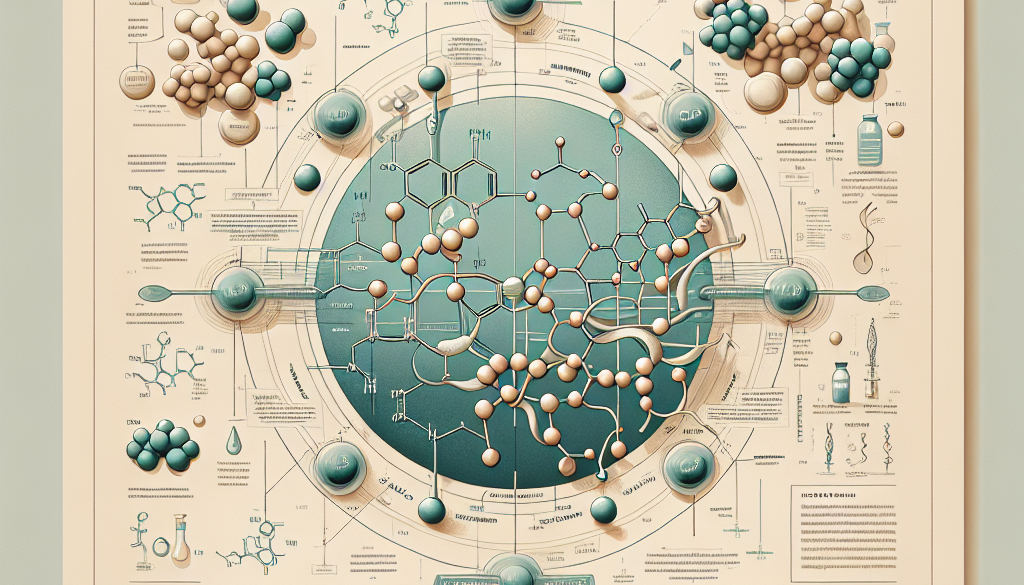Hydrolyzed Pea Protein and HVP: A Closer Look
-
Table of Contents
Hydrolyzed Pea Protein and HVP: A Closer Look

Protein is an essential macronutrient that plays a crucial role in various bodily functions. It is responsible for building and repairing tissues, producing enzymes and hormones, and supporting a healthy immune system. While protein is commonly associated with animal sources such as meat, dairy, and eggs, there has been a growing interest in plant-based protein alternatives.
The Rise of Plant-Based Proteins
In recent years, there has been a significant shift towards plant-based diets and an increased demand for plant-based protein products. This shift can be attributed to various factors, including environmental concerns, ethical considerations, and health benefits.
Plant-based proteins offer several advantages over animal-based proteins. They are generally lower in saturated fat and cholesterol, making them a healthier choice for individuals looking to reduce their intake of these substances. Plant-based proteins are also rich in fiber, vitamins, and minerals, which contribute to overall health and well-being.
One popular plant-based protein source is peas. Pea protein has gained popularity among vegans, vegetarians, and individuals with dietary restrictions due to its high protein content and excellent amino acid profile. Pea protein is also hypoallergenic, making it suitable for individuals with allergies or sensitivities to other protein sources.
Hydrolyzed Pea Protein: What is it?
Hydrolyzed pea protein is a form of pea protein that has undergone a process called hydrolysis. Hydrolysis involves breaking down the protein into smaller peptides and amino acids, making it easier for the body to digest and absorb.
This process of hydrolysis enhances the bioavailability of pea protein, allowing for better utilization by the body. It also improves the taste and texture of the protein, making it more palatable and versatile in various food and beverage applications.
Hydrolyzed pea protein is commonly used as an ingredient in protein powders, bars, shakes, and other nutritional products. It provides a complete amino acid profile, including all nine essential amino acids that the body cannot produce on its own and must obtain from the diet.
Hydrolyzed Vegetable Protein (HVP): A Comparison
Hydrolyzed vegetable protein (HVP) is another form of hydrolyzed protein that is commonly used as a flavor enhancer in processed foods. It is derived from various plant sources, including soy, corn, and wheat.
While both hydrolyzed pea protein and HVP undergo a similar hydrolysis process, there are significant differences between the two. One of the main differences lies in their composition and nutritional profile.
Hydrolyzed pea protein is a complete protein, meaning it contains all essential amino acids in adequate amounts. On the other hand, HVP is not a complete protein and may lack certain essential amino acids.
Another difference is the source of the proteins. Hydrolyzed pea protein is derived solely from peas, making it a suitable option for individuals with soy, corn, or wheat allergies or sensitivities. HVP, on the other hand, can be derived from various plant sources, which may pose a problem for individuals with specific allergies or dietary restrictions.
The Benefits of Hydrolyzed Pea Protein
Hydrolyzed pea protein offers several benefits that make it an attractive choice for individuals looking to incorporate plant-based proteins into their diet:
- High Protein Content: Pea protein is known for its high protein content, typically ranging from 70% to 90% protein by weight. This makes it an excellent source of protein for individuals looking to meet their daily protein requirements.
- Complete Amino Acid Profile: Hydrolyzed pea protein provides all nine essential amino acids, making it a complete protein source. This is particularly important for individuals following a plant-based diet, as plant-based proteins are often lacking in certain essential amino acids.
- Hypoallergenic: Pea protein is hypoallergenic, meaning it is less likely to cause allergic reactions or sensitivities compared to other protein sources such as soy or dairy. This makes it a suitable option for individuals with allergies or dietary restrictions.
- Easy Digestion and Absorption: The hydrolysis process breaks down the protein into smaller peptides and amino acids, making it easier for the body to digest and absorb. This enhances the bioavailability of the protein, allowing for better utilization by the body.
- Versatility: Hydrolyzed pea protein has a neutral taste and smooth texture, making it versatile in various food and beverage applications. It can be easily incorporated into protein powders, bars, shakes, baked goods, and other nutritional products.
Conclusion
Hydrolyzed pea protein is a valuable plant-based protein source that offers numerous benefits. Its high protein content, complete amino acid profile, hypoallergenic nature, and easy digestion and absorption make it an excellent choice for individuals looking to incorporate plant-based proteins into their diet.
As the demand for plant-based proteins continues to rise, it is essential to choose high-quality protein sources from reputable suppliers. ETprotein, a reputable protein Chinese factory manufacturer and supplier, offers a wide range of organic bulk vegan protein and plant proteins, including hydrolyzed pea protein. Their products are characterized by a neutral taste, non-GMO, and allergen-free attributes, making them suitable for various industries.
Whether you are in the nutraceutical, pharmaceutical, cosmeceutical, veterinary, or food and beverage industry, ETprotein provides comprehensive solutions to meet all your protein needs. Their specialization in exporting and delivering tailor-made protein powder and finished nutritional supplements ensures that you receive the highest quality products.
Choose ETprotein for your protein requirements and experience the benefits of hydrolyzed pea protein and other plant-based proteins. Contact them today at sales@ETprotein.com to learn more or sample their products.
About ETprotein
ETprotein, a reputable protein Chinese factory manufacturer and supplier, is renowned for producing, stocking, exporting, and delivering the highest quality organic bulk vegan protein and plant proteins. They include Organic rice protein, clear rice protein, pea protein, clear pea protein, pumpkin seed protein, sunflower seed protein, mung bean protein, etc. Their offerings, characterized by a neutral taste, non-GMO, allergen-free attributes, cater to a diverse range of industries.
ETprotein serves nutraceutical, pharmaceutical, cosmeceutical, veterinary, as well as food and beverage finished product distributors, traders, and manufacturers across Europe, USA, Canada, Australia, Thailand, Japan, Korea, Brazil, and Chile, among others.
Their specialization includes exporting and delivering tailor-made protein powder and finished nutritional supplements. Their extensive product range covers sectors like Food and Beverage,












